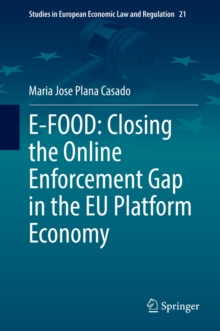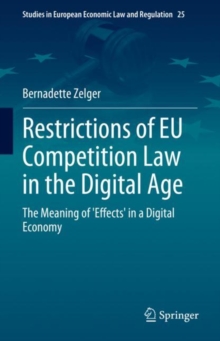
Beyond Networks - Interlocutory Coalitions, the European and Global Legal Orders PDF
by Gianluca Sgueo
Part of the Studies in European Economic Law and Regulation series
- Information
Description
Thisbook explores the activism promoted by organised networks of civil society actorsin opening up possibilities for more democratic supranational governance. Itexamines the positive and negative impact that such networks of civil societyactors – named “interlocutory coalitions” – may have on the convergence ofprinciples of administrative governance across the European legal system andother supranational legal systems.
Thebook takes two main controversial aspects into account: the first relates tothe convergence between administrative rules pertaining to differentsupranational regulatory systems. Traditionally, the spread of methods ofadministrative governance has been depicted primarily against the background ofthe interactions between the domestic and the supranational arena, both from atop-down and bottom-up perspective. However, the exploration of interactionsoccurring at the supranational level between legal regimes is still notgrounded on adequate empirical evidence. The second controversial aspectconsidered in this book consists of the role of civil society actors operatingat the supranational level. In its discussion of the first aspect, the bookfocuses on the relations between the European administrative law and theadministrative principles of law pertaining to other supranational regulatoryregimes and regulators, including the World Bank, the International MonetaryFund, the World Trade Organization, the United Nations, the Organization forEconomic Cooperation and Development, the Asian Development Bank, and theCouncil of Europe. The examination of the second aspect involves theexploration of the still little examined, but crucial, role of civil societyorganised networks in shaping global administrative law. These “interlocutorycoalitions” include NGOs, think tanks, foundations, universities, andoccasionally activists with no formal connections to civil society organisations. The book describes such interlocutory coalitions as drivers of harmonizedprinciples of participatory democracy at the European and global levels. However, interlocutory coalitions show a number of tensions (e.g. thegovernability of coalitions, the competition among them) that may hamper the impactthey have on the reconfiguration of individuals’ rights, entitlements andresponsibilities in the global arena.
Information
-
Download Now
- Format:PDF
- Publisher:Springer International Publishing
- Publication Date:06/04/2016
- Category:
- ISBN:9783319288758
Information
-
Download Now
- Format:PDF
- Publisher:Springer International Publishing
- Publication Date:06/04/2016
- Category:
- ISBN:9783319288758



